- Home
- Karen Traviss
True Colors Page 2
True Colors Read online
Page 2
There’s just Sergeant Kal and Etain and my brothers. Oh, and Jusik. General Jusik’s one of us. Nobody else really cares.
“I’ve got a clean conscience,” Darman said. It had come as a surprise to him after years of cloistered training on Kamino to discover that many cultures in the galaxy regarded him as a killer, something immoral. “Either that, or I’m too tired to worry.”
Now he was going to Gaftikar to do some more killing. The Alpha ARCs might have been sent in to train the local rebels, but Omega were being inserted to topple a government. It wasn’t the first, and it probably wouldn’t be the last.
“Heads up, people, here we go.” Niner activated the receiver. The blue holoimage leapt from the projector and burly, bearded Jedi General Arligan Zey, Director of Special Forces, was suddenly sitting in the compartment with them.
“Good afternoon, Omega,” he said. It was the middle of the night as far as they were concerned. “I’ve got a little good news for you.”
Fi was back on the secure helmet comlink now. Darman’s red HUD audio icon indicated that only he could hear him. “Which means the rest of it is bad.”
“That’s good, sir,” said Niner, deadpan. “Have we located ARC Alpha-Thirty?”
Zey seemed to ignore the question. “Null Sergeant A’den’s sent secure drop zone coordinates, and you’re clear to go in.”
Fi’s comlink popped in Darman’s ear again. “Here comes the but.”
“But,” Zey went on, “ARC Trooper Alpha-Thirty now has to be treated as MIA. He hasn’t reported in for two months, and that isn’t unusual, but the local resistance told Sergeant A’den that they lost contact about the same time.”
A’den was one of Skirata’s Null ARCs. He’d been sent in a few standard days ago to assess the situation, and if he couldn’t find the missing ARC trooper, then the man was definitely lost, as in dead lost. Darman wondered what could possibly have happened to an ARC. They weren’t exactly easy kills. The Nulls treated their Alpha brothers as knuckle-draggers, but they were pure Jango Fett, genetically unaltered except for their rapid aging, and they’d been trained by him personally: hard, resourceful, dangerous men. Still, even the best could have bad luck. It meant that training and motivating the Gaftikari resistance was down to A’den now.
Darman hoped it didn’t end up being his job. All he could think about was how long he’d be stuck there and when he might see Etain again. Smuggled letters and comlink signals weren’t enough.
So what can they do to us? So what if anyone finds out?
Darman didn’t really know how hard the Grand Army or the Jedi Council could make life for him or Etain. There was always the chance that he’d never see her again. He wasn’t sure he could handle that. He knew she was his only taste of a real life.
“So are we starting over, General?” Niner asked.
Zey’s desk wasn’t visible in the holoimage but he was sitting down, and he glanced over his shoulder as if someone had come into the room. “Not entirely. The rebel militias are competent, but they still need some help in destabilizing the Gaftikari government. And they need equipment like the Deeces we’re dropping.” Zey paused. “Not full spec, of course.”
“I see we trust them implicitly, sir…”
“We’ve had one or two aid operations backfire, Sergeant, I admit that. No point overarming them so they can turn around and use the kit on us. This does the job.”
“Any general intel update on Gaftikar?”
“No. Sorry. You’ll have to fill in the gaps yourself.”
“Numbers?”
“A’den says around a hundred thousand trained rebel troops.”
Darman blinked to activate his HUD database and checked the estimated population of Gaftikar. Half a billion: capital city Eyat, population five hundred thousand. He was used to odds like that now.
“Well, at least Alpha-Thirty was busy while he was there, sir,” said Niner.
“The rebels are very good at cascading training. Train ten—they train ten each—and so on.”
“Given our limited numbers, sir, have you ever thought about deploying the whole GAR that way? The war would be over a lot faster.”
“It’s a strategy, I know…” Zey always had that note in his voice lately that made him sound ashamed and embarrassed. Nobody had to ask if this was how he wanted to play things. It was another objective from the Chancellor on the list of take-this-planet-and-don’t-give-me-excuses orders. “But all you need to do is remove the leadership of the Eyat administration, and the rest follows. So you prepare the battleground for the infantry. Enable the rebels.”
Do what you can, lads, because I can’t spare any more men to help you. Great…
“Understood,” said Niner. Sometimes Darman wanted to ram his sergeant’s patient acceptance down his throat. “Omega out.”
Nobody needed to remind Zey how thinly spread all the GAR forces were, especially Special Operations. They were cross-training regular troopers for commando roles now: the GAR had fewer than five thousand Republic commandos. Inadequate didn’t even come close. It was a joke. Darman waited for Niner to sign off with a surprisingly perfunctory salute and close the link, and that wasn’t good old gung-ho Niner at all. It was the closest he’d ever come to showing his frustration to the squad.
Maybe the Republic would have been better off with droids after all. They don’t get hacked off about what’s happening to them.
And they don’t fall in love.
“I’ll try to look on the bright side, seeing as that’s my job,” said Fi. “Last time we inserted into enemy territory without any decent intel and with totally inadequate numbers, we made lots of interesting new friends. Maybe I’ll be the one to get lucky this time.”
Darman ignored the gibe about Etain. “The Gaftikari rebels aren’t your type, Fi. They’re lizards.”
“So are Falleen.”
“I mean lizard lizards. Luggage on legs.”
“They’ve got a human population, too…”
“Optimist.”
Niner changed the subject with uncharacteristic gentleness. “Come on, we always insert without enough intel.” He hadn’t told Fi to shut up in ages, as if he felt sorry for him now. “It’s the way the world works. Okay, buckets on. We’ll be over Eyat in twenty minutes.”
The Core Conveyor’s cargo hangar was a stark void with a ramped air lock at one end. It was an armed freighter, one of many commandeered from the merchant fleet—taken up from trade, and so nicknamed TUFTies—and it was built simply to move vehicles and supplies, and sometimes men, and unload them discreetly where required. Darman wondered what its cargo had been in peacetime. Like the small traffic interdiction vessels, it masqueraded as a neutral civilian craft for covert operations. TUFTies could be deployed on planets where the arrival of an Acclamator would get the wrong sort of attention.
The hangar was packed with speeder bikes and crates. Darman picked his way through them, following Atin to the hangar doors where a loadmaster in yellow-trimmed pilot armor minus helmet steered crates on repulsors toward the ramp and lined them up.
“Deeces,” said the loadmaster, not looking up from his datapad. “And a few E-Webs and one large arty piece.”
“How many ’Webs?” Atin asked.
“Fifty.”
“Is that the best we can do?”
“We’ve been arming them for a year. Just a top-up.” The loadmaster seemed satisfied that he had the correct consignments and stared at the commandos with a wary eye. He reached for the rail that ran along the bulkhead and hooked his safety line to it. “If it’s any comfort, you look pretty sinister in that black rig. Even with the white wings. I don’t think you’re a bunch of overrated Mando-loving weirdos at all…”
Fi gave him a bow. “May all your future deployments be with the Galactic Marines on ’fresher detail, ner vod.”
But Atin could never pass things off with a joke. “What’s your problem, pal?”
“Just wondering,” said th
e loadmaster.
“Wondering what?”
“Mandos. You ever fought those guys? I have. They keep popping up in Sep forces. They kill us. And you were raised as good little Mando boys. Is that who you feel you are?”
“Let’s put it this way,” said Fi. “I don’t feel like a Republic citizen, because none of us are, in case you hadn’t noticed. We don’t exist. No vote, no identification docs, no rights.”
Niner shoved Fi in the back. “One-Five, shut it. Loadmaster, wind your neck in and don’t question our loyalty, or I’ll have to smack you. Now let’s get to work.”
It was the first time that Darman could recall the sense of brotherhood among clones—all clones, regardless of unit—faltering. The 2nd Airborne obviously had an issue with Mandalorians, and maybe the nearest they could kick were the Republic commandos—raised, trained, and educated mostly by Mandalorian sergeants like Skirata, Vau, and Bralor. He thought it was a bad omen for the mission. Yes, Sergeant Kal would be very upset to see this.
Core Conveyor was low enough now for them to see the landscape beneath from one of the viewports. Darman could see from his HUD icon of Niner’s field of view that he wasn’t looking at the drop zone but was engrossed in his datapad. It was just a mass of numbers. Atin, though, was reading a message, and although Darman tried not to be nosy he couldn’t help but notice that it was from Laseema, his Twi’lek girlfriend, and it was… educational.
They do say it’s the quiet ones that want watching…
Darman tried to concentrate on Gaftikar. It looked like a nice place even at night. It wasn’t a red, dusty wasteland like Geonosis, or a freezing wilderness like Fest. From this height, the city of Eyat was a mosaic of illuminated parkland and busy, straight roads fringed by regularly spaced houses speckled with gold light. A river wandered through the landscape, visible as a black glittering ribbon. It looked like the kind of place where people had normal lives and enjoyed themselves. It didn’t look like enemy territory at all.
Darman cut into Fi’s personal circuit to speak but was instantly deafened by the volume of the glimmik music. That was how Fi dealt with things: a thick wall of noise and chatter to shut out the next moment. Darman cut out of the circuit again.
The loadmaster lowered his visor and placed his hand over the control panel. “Okay, remember—just let yourselves drop like a normal parasail jump for a few seconds, then activate the jets. Don’t power out. Opening in five… four…”
“I’d rather know if the jet pack didn’t work when I still had my boots on the deck,” Fi said.
“… two… and… go.”
The cargo doors slid back and a fierce blast of air peppered dust against Darman’s visor. The charts were over thick forest now; the loadmaster had one hand on the cargo release and his head turned toward the holochart projected on the control panel. It showed open land a few kilometers ahead. When Conveyor overflew it, the open space turned out to be short, dry grass. It showed up clearly in Darman’s night-vision filter.
“Kit away,” said the loadmaster, releasing the static lines. The crates slipped off the ramp one by one and glided toward the land on extraction parasails that looked like exotic white blooms opening in the night. The last container dwindled to a speck beneath them, hitting the grass in a plume of dust. The ship climbed a little, and the ramp raised to a flat platform. “This is your stop, Omega. Stay safe, okay?”
Darman, like all the commandos, had done plenty of freefall jumps. He couldn’t even recall how many, but he still felt a brief burst of adrenaline as he watched Atin walk calmly off the end of the ramp and vanish. Darman followed him, gripping his DC-17 flat against his chest on its sling.
One, two, three, four paces, and then five—on five, there was nothing beneath the soles of his boots. He fell and his stomach seemed to collide with his lungs, forcing the breath out of them for a heartbeat. He hit the jet-pack power button on his harness on the count of three. The wings ejected from their housing: the motor kicked in. He wasn’t falling any longer. He was flying, with the faint vibration of the jets making his sinuses itch. The green-lit image of Gaftikar’s heathland spread beneath him, and when he turned his head he could see the faint heat profile from Atin’s jets. Conveyor was gone. The crate had a lot more acceleration than he’d thought.
“Look, Ma,” said Fi’s disembodied voice on the secure channel. “No hands.”
“You haven’t got a ma,” said Darman.
“Maybe a nice old lady will adopt me. I’m very lovable.”
Darman couldn’t see the others now, only their viewpoint icons on his helmet’s HUD. The squad split up, each man following a different flight path to the RV point, dropping as low as they could and hugging the contours of the land. The plan was to hit the ground running—literally—as soon as the terrain changed to woods they could use for cover. Darman didn’t make quite the clean landing he’d expected. He somersaulted on the tip of one wing, coming to rest in low scrubby bushes.
Niner must have seen his HUD icon. “Can’t you ever land on your feet, Dar?”
“Osik.” Darman was more embarrassed than hurt. At least he hadn’t set fire to the vegetation: the jets shut off on impact. He scrambled to his feet and reoriented himself. “I’m okay.”
He couldn’t tell where Fi and Atin were from the view in their HUD icons. But he could see they were moving fast, and their transponders were converging on the RV coordinates, blue squares edging toward a yellow cross superimposed on a chart of the drop zone. He realized he still had fifty meters to run with the jet pack, wings spread like an insect.
“All clear.” Niner grunted as if he was struggling out of his harness. “Short-range comms only from now on, Omega. Now where—”
“Y’know, on Urun Five, the locals would stick you on top of a festival tree as a decoration.”
An unfamiliar voice cut into Darman’s comm circuit. Now he could see a shape in his night vision, a faint outline that didn’t resolve into a man until he was right on top of it. He could see who it was now, a man who looked pretty much like himself except that, like all the Nulls, he was broader and heavier. The Kaminoans had played around with the Fett genome a little too much at first. Darman wondered how many other experiments they tried before they got the mix right.
A’den, Null ARC N-12, grabbed him by the arm and beckoned him to follow. He was wearing rough working clothes: no helmet, no plates, and no distinctive kilt-like kama. Darman hadn’t been expecting to find him in civvies.
And as he picked his way through the undergrowth, cursing the stupid wings that now wouldn’t retract because he’d bent the mechanism in the fall, he also didn’t expect to see small fast-moving figures with bright reflective eyes emerging with DC-15 rifles.
They were lizard lizards, all right.
GAR base,
Teklet, Qiilura,
470 days after Geonosis, deadline for the withdrawal of human colonists
General Etain Tur-Mukan had never felt less like doing a day’s duty in her life. But she would do it. She had to.
Outside the army headquarters building—a modest house that had once belonged to a Trandoshan slaver, now long gone with the rest of the occupying Separatist forces—a crowd of farmers stood in grim silence. She paused in front of the doors and prepared to step outside to reason with them.
You have to leave. It’s the deal we did, remember?
“I don’t think you should handle this, ma’am,” said the garrison’s commander, Levet. His yellow-trimmed helmet was tucked under one arm; a fit, clean-shaven, black-haired man in his twenties, so much like Darman that it hurt. “Let me talk to them.”
He was a clone, like Dar—exactly like Dar, exactly like every other clone in the Grand Army of the Republic, although without Dar’s permanent expression of patient good humor. He had those same dark eyes that gave Etain a pang of loneliness and yearning at the constant reminder that Dar was… where? At that moment, she had no idea. She could feel him in the Force, as she alway
s could, and he was unharmed. That was all she knew. She made a mental note to contact Ordo later to check his location.
“Ma’am,” said Levet, a little more loudly. “Are you all right? I said I’ll do this.”
Etain made a conscious effort to stop seeing Darman in Levet’s face. “Responsibility of rank, Commander.” Behind her, she heard a faint silken rustle like an animal moving. “But thank you.”
“You need to be careful,” said a low, liquid voice. “Or we’ll have your nasty little sergeant to answer to.”
Jinart brushed past Etain’s legs. The Gurlanin shapeshifter was in her true form of a sleek black carnivore, but she could just as easily have transformed herself into the exact replica of Levet—or Etain.
Nasty little sergeant. Sergeant Kal Skirata—short, ferocious, angry—had exiled her here for a few months. She’d fallen from grace with him. Now that she was several months’ pregnant, she’d started to understand why.
“I’m being careful,” Etain said.
“He holds me responsible for your safety.”
“You’re scared of him, aren’t you?”
“And so are you, girl.”
Etain draped her brown robes carefully to disguise the growing bulge of pregnancy and pulled another loose coat on top. Teklet was in the grip of winter, which was just as well: the excuse for voluminous clothes was welcome. But even without the top layer, she didn’t look conspicuously pregnant. She just felt it, tired and lonely.
Nobody here would know or care who the father was anyway.
“There’s no need for you to supervise the evacuation personally,” said Jinart. “The fewer who see you, the better. Don’t tempt fate.”
Etain ignored her and the doors parted, letting a snow-speckled gust of cold air into the lobby. Jinart shot out in front of her like a sand panther and bounded through the drifts.
“Insanity,” the Gurlanin hissed. She progressed in flowing leaps. “You have a child to worry about.”
“My son,” Etain said, “is fine. And I’m not ill, I’m pregnant.”

 Halo: Glasslands
Halo: Glasslands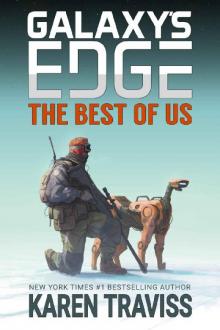 The Best of Us
The Best of Us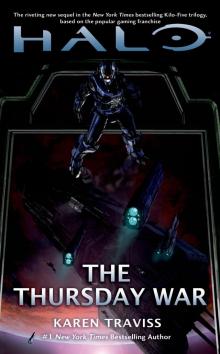 Halo: The Thursday War
Halo: The Thursday War Ally
Ally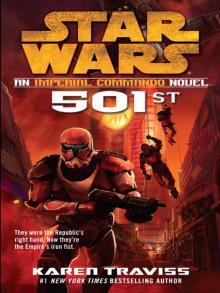 501st: An Imperial Commando Novel
501st: An Imperial Commando Novel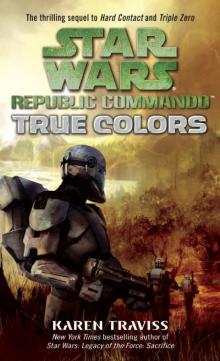 True Colors
True Colors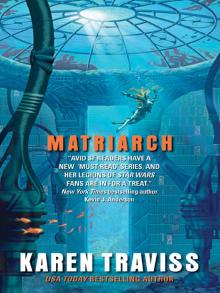 Matriarch
Matriarch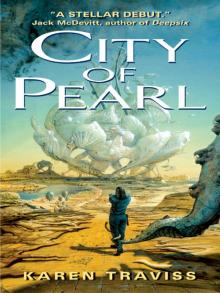 City of Pearl
City of Pearl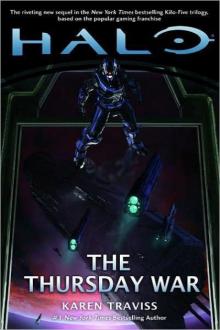 The Thursday War
The Thursday War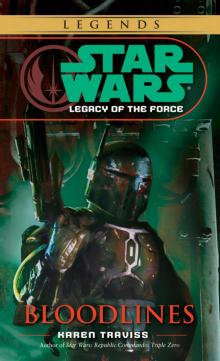 Bloodlines
Bloodlines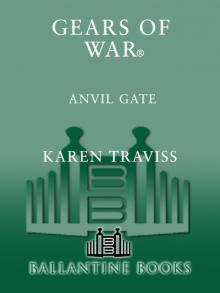 Gears of War: Anvil Gate
Gears of War: Anvil Gate Crossing the Line
Crossing the Line Star Wars - The Clone Wars 01
Star Wars - The Clone Wars 01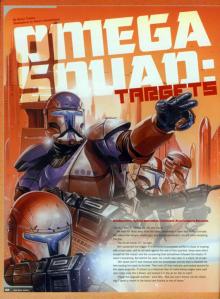 Omega Squad: Targets
Omega Squad: Targets Halo®: Mortal Dictata
Halo®: Mortal Dictata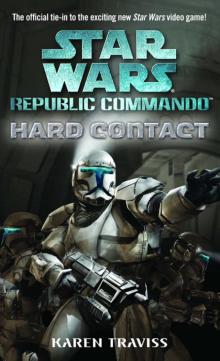 Hard Contact
Hard Contact The World Before
The World Before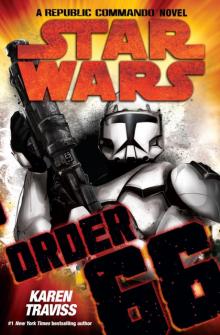 Order 66
Order 66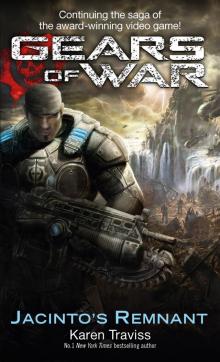 Gears of War: Jacinto's Remnant
Gears of War: Jacinto's Remnant Sacrifice
Sacrifice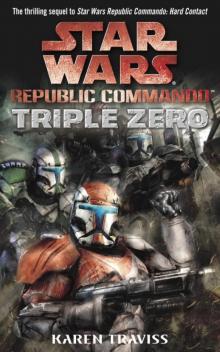 Triple Zero
Triple Zero Gears of War: The Slab (Gears of War 5)
Gears of War: The Slab (Gears of War 5)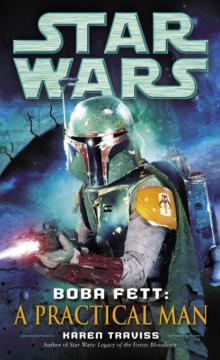 NEW JEDI ORDER: BOBA FETT: A PRACTICAL MAN
NEW JEDI ORDER: BOBA FETT: A PRACTICAL MAN Going Grey
Going Grey Star Wars: Boba Fett: A Practical Man
Star Wars: Boba Fett: A Practical Man Revelation
Revelation Coalition's End
Coalition's End No Prisoners
No Prisoners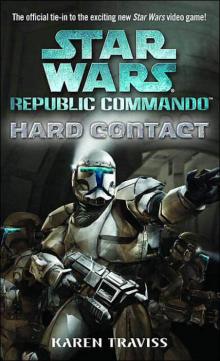 Star Wars Republic Commando: Hard Contact
Star Wars Republic Commando: Hard Contact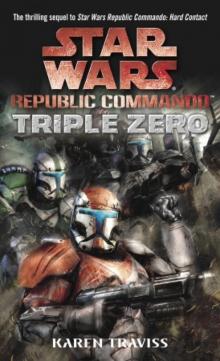 Star Wars: Republic Commando: Triple Zero rc-3
Star Wars: Republic Commando: Triple Zero rc-3 The Clone Wars
The Clone Wars The Clone Wars: No Prisoners
The Clone Wars: No Prisoners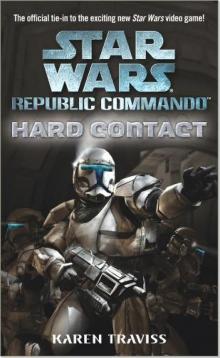 Star Wars: Republic Commando: Hard Contact rc-1
Star Wars: Republic Commando: Hard Contact rc-1 Judge
Judge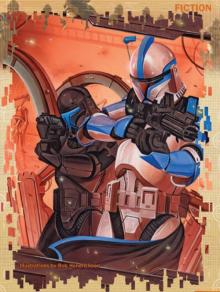 Omega Squad: Targets rc-4
Omega Squad: Targets rc-4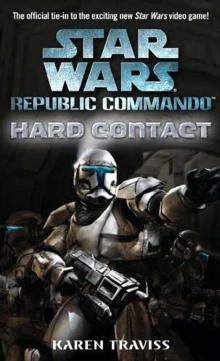 Star Wars - Republic Commando - Hard Contact
Star Wars - Republic Commando - Hard Contact